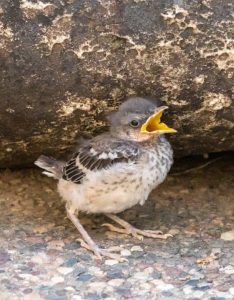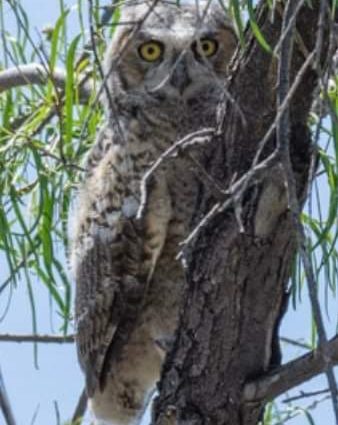It’s that time of year when animal rescue centers get an abundance of calls about baby birds on the ground.

Fledglings are when birds are just developing their feathers and still have a lot of down fluff and partially developed primary and flight feathers and they look like they shouldn’t be seen on the ground, nearby, or around the bottom of a tree. However, in fact
, they are branching. Branching is when they come out of their nest and hop from branch to branch. Many times they will test their wings and try to fly to another branch that is too far away, and they will float down to the ground.
A lot of baby birds, especially raptors such as Hawks and Owls, have the ability to climb back up the tree. But in some cases when they are not able to, the parents will feed and protect them on the ground as they continue to hop around and wait for their feathers to have fully developed. Fledglings are the most common birds to be mistaken for needing help. When in fact they are just doing what is normal, and the parents will continue to care for them.
If you ever encounter a fledgling, always watch from a distance; a good safe distance because the parents won’t feed or care for them if they see humans around or any other type of threat. And it is especially important to make sure cats or dogs won’t be a threat to the little ones. If for some reason you don’t see the parents feeding the fledgling every half hour or so, contact your local
wildlife rehab center for advice. If a fledgling is mistakenly brought in, they can always be re-introduced to their parents within 24 hours. Many calls are being received about owls at this time of the season.
Now nestlings are a different story, when a baby bird has nothing but fluff and is featherless and its eyes are still closed, the best thing to do is to try to put it back in the nest. If that’s not possible, leave it be, if it’s extremely hot direct sunlight, move the nestling into the shade and the parents will find and care for it. Sometimes parents will also move it to bushes themselves for safety where they can feed it. So if you find a baby bird, it likely does not need your help unless it is featherless or has its eyes closed. Don’t worry, your scent won’t deter the parents, just be sure to give them plenty of space for nature to do its work.
Native Animal Rescue (831) 462-0726, 1855 17th Ave. Santa Cruz, CA


